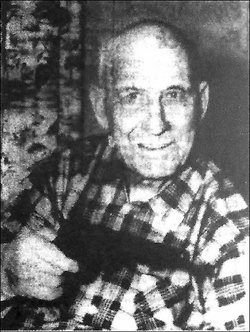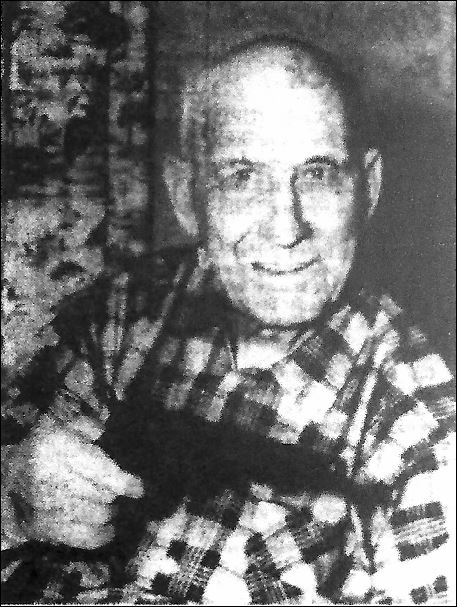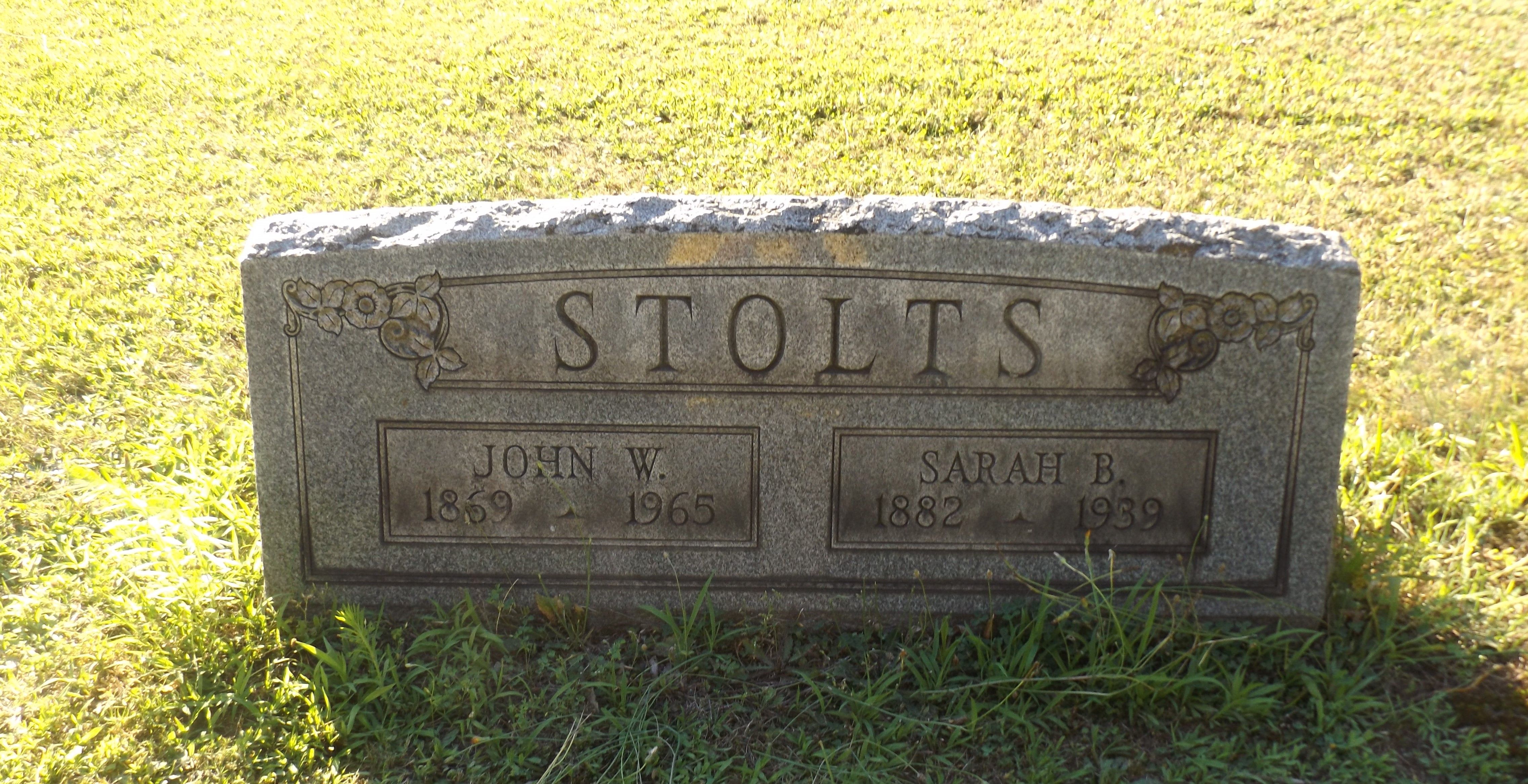The hand holding the six shooter was not
as steady as it had been some 70 years ago,
but the memories it brought back were
still strong as the hammer fell on an
empty chamber.
John Stolts of 486 Old Falls Blvd.
looked up from sighting the long barrel of
the .44 Colt to remark "this revolver is
nearly as old as I am."
Today, as Mr. Stolts celebrates his 90th
birthday, the revolver is no longer worn
close at hand as it was in his youth in
South Dakota. It reposes unloaded in a
dresser drawer, but close enough
to look at and hold with fondness.
The revolver recalls no memories for Mr. Stolts
of gun fights or blood shed, but rather
carries him back to an earlier era of his life.
He frankly admits that while he saw
some gunfighters, he never witnessed
a gun fight nor did he ever use his
own .44 to defend his life.
"I was sure glad I had it one day
when a friend and I were walking
across the Sioux reservation after
quitting a railroad job some 100 miles
away," he recalled. "We met up with a
party of Sioux on their way to join
Sitting Bull. I felt a lot safer having
the revolver, but didn't need it."
THEY STOPPED BRIEFLY but there was no
conversation because the Sioux couldn't
speak English and Mr. Stolts and his friend
could speak no Sioux.
Mr. Stolts was born in Farnham,
near Buffalo, Feb. 28, 1869. His family
decided to move west when he was 13.
He, his mother, two brothers and
a sister stopped briefly with relatives
in Chicago, while his father went on
to take a "preemption" on 160 acres
of government land.
"We stayed a week in Chicago
and then went on by rail to our new
home in South Dakota. My father died
of pneumonia a week after we
arrived," Mr. Stolts recalled.
Mr. Stolts and his brothers,
Charles (deceased) and Martin took
over the operation of the farm, which
was near Mitchell and Alexandria in
southeastern South Dakota.
"Horses were scarce, so we
bought a yoke of oxen for $180," Mr.
Stolts recalled. "A round trip to town,
about 10 miles away, took all day with
those oxen and a wagon!"
He and his family remained in
South Dakota for 12 years. Times
were bad during that period, so Mr.
Stolts hired out to neighboring farmers,
migrated to Omaha, Neb., to help
with harvests and also worked for the
railroad.
THE STOLTS FAMILY finally
rented their farm (later sold it)
and (by 1893 all the family)
moved back east. Mr. Stolts went to
work in the locomotive shops in
Dunkirk and later joined the Western
New York Telephone Co. He helped to
lay telephone line from Terre Haute,
Ind., to Louisville, Ky.
"I quit the telephone company after a
couple of years, couldn't stand to
be on the move so much. Here one day
and some other town the next was
just too much," he said.
He turned his energies to work
in a canning factory near Eden.
Later, he and his brothers bought 160
acres at South Dayton. They soon added
another 50 acres of muck land, and
a profitable truck farming and hay
business.
"Why we used to ship onions, lettuce
and hay to Buffalo by the carload,
" Mr. Stolts reported with much
pride.
After about 10 good years of farming,
things again turned bad - the bottom fell
out of the onion market - and Mr. Stolts
returned to canning factory employment.
In 1939, after the death of his
wife, (Sarah Barbara Berns
b. 28 Aug 1882 in Farnham, Erie,
New York d. 12 Apr 1939 in
Silver Creek, Chautauqua, New York),
Mr. Stolts moved to North Tonawanda
and worked as a watchman for the
Battenfeld Grease & Oil Co. for a
couple of years before retiring.
HIS LATER YEARS have been pain-filled
ones. About 15 years ago the nerves in
his spine were injured and he slowly
became crippled. Today, he must hand
lift his legs in order to move them at all.
He hasn't been out of his second
floor bedroom in five or six years.
His days are spent in reading, particularly
the bible which he has read five or
six times, and in doing jigsaw puzzles.
"We used to take him downstairs
on a straight chair but the pain has
become so great we don't try anymore,"
said his daughter, Mrs. Chauncey E.
Goodrich with whom he lives.
"But he never complains and is cheerful
most of the time despite intense pain."
Mr. Stolts is a member of St. Martin's
Lutheran Church. ...
Mr. Stolts is particularly proud of
his three grandsons, one granddaughter
and five great grandchildren. Their
pictures stand on his bedroom dresser.
The grandchildren are C. Glenn Goodrich,
a music teacher in the Kenmore-Town of
Tonawanda school system;
Nelson Goodrich, purchasing agent
for Continental Can Co.; John Goodrich,
production manager for Continental Can
Co. at Garden City, Mich., and
Mrs. Barbara Zimmerman, a
nurse at Childrens' Hospital.
Source: Tonawanda NEWS Saturday, February 28, 1959 p2
The hand holding the six shooter was not
as steady as it had been some 70 years ago,
but the memories it brought back were
still strong as the hammer fell on an
empty chamber.
John Stolts of 486 Old Falls Blvd.
looked up from sighting the long barrel of
the .44 Colt to remark "this revolver is
nearly as old as I am."
Today, as Mr. Stolts celebrates his 90th
birthday, the revolver is no longer worn
close at hand as it was in his youth in
South Dakota. It reposes unloaded in a
dresser drawer, but close enough
to look at and hold with fondness.
The revolver recalls no memories for Mr. Stolts
of gun fights or blood shed, but rather
carries him back to an earlier era of his life.
He frankly admits that while he saw
some gunfighters, he never witnessed
a gun fight nor did he ever use his
own .44 to defend his life.
"I was sure glad I had it one day
when a friend and I were walking
across the Sioux reservation after
quitting a railroad job some 100 miles
away," he recalled. "We met up with a
party of Sioux on their way to join
Sitting Bull. I felt a lot safer having
the revolver, but didn't need it."
THEY STOPPED BRIEFLY but there was no
conversation because the Sioux couldn't
speak English and Mr. Stolts and his friend
could speak no Sioux.
Mr. Stolts was born in Farnham,
near Buffalo, Feb. 28, 1869. His family
decided to move west when he was 13.
He, his mother, two brothers and
a sister stopped briefly with relatives
in Chicago, while his father went on
to take a "preemption" on 160 acres
of government land.
"We stayed a week in Chicago
and then went on by rail to our new
home in South Dakota. My father died
of pneumonia a week after we
arrived," Mr. Stolts recalled.
Mr. Stolts and his brothers,
Charles (deceased) and Martin took
over the operation of the farm, which
was near Mitchell and Alexandria in
southeastern South Dakota.
"Horses were scarce, so we
bought a yoke of oxen for $180," Mr.
Stolts recalled. "A round trip to town,
about 10 miles away, took all day with
those oxen and a wagon!"
He and his family remained in
South Dakota for 12 years. Times
were bad during that period, so Mr.
Stolts hired out to neighboring farmers,
migrated to Omaha, Neb., to help
with harvests and also worked for the
railroad.
THE STOLTS FAMILY finally
rented their farm (later sold it)
and (by 1893 all the family)
moved back east. Mr. Stolts went to
work in the locomotive shops in
Dunkirk and later joined the Western
New York Telephone Co. He helped to
lay telephone line from Terre Haute,
Ind., to Louisville, Ky.
"I quit the telephone company after a
couple of years, couldn't stand to
be on the move so much. Here one day
and some other town the next was
just too much," he said.
He turned his energies to work
in a canning factory near Eden.
Later, he and his brothers bought 160
acres at South Dayton. They soon added
another 50 acres of muck land, and
a profitable truck farming and hay
business.
"Why we used to ship onions, lettuce
and hay to Buffalo by the carload,
" Mr. Stolts reported with much
pride.
After about 10 good years of farming,
things again turned bad - the bottom fell
out of the onion market - and Mr. Stolts
returned to canning factory employment.
In 1939, after the death of his
wife, (Sarah Barbara Berns
b. 28 Aug 1882 in Farnham, Erie,
New York d. 12 Apr 1939 in
Silver Creek, Chautauqua, New York),
Mr. Stolts moved to North Tonawanda
and worked as a watchman for the
Battenfeld Grease & Oil Co. for a
couple of years before retiring.
HIS LATER YEARS have been pain-filled
ones. About 15 years ago the nerves in
his spine were injured and he slowly
became crippled. Today, he must hand
lift his legs in order to move them at all.
He hasn't been out of his second
floor bedroom in five or six years.
His days are spent in reading, particularly
the bible which he has read five or
six times, and in doing jigsaw puzzles.
"We used to take him downstairs
on a straight chair but the pain has
become so great we don't try anymore,"
said his daughter, Mrs. Chauncey E.
Goodrich with whom he lives.
"But he never complains and is cheerful
most of the time despite intense pain."
Mr. Stolts is a member of St. Martin's
Lutheran Church. ...
Mr. Stolts is particularly proud of
his three grandsons, one granddaughter
and five great grandchildren. Their
pictures stand on his bedroom dresser.
The grandchildren are C. Glenn Goodrich,
a music teacher in the Kenmore-Town of
Tonawanda school system;
Nelson Goodrich, purchasing agent
for Continental Can Co.; John Goodrich,
production manager for Continental Can
Co. at Garden City, Mich., and
Mrs. Barbara Zimmerman, a
nurse at Childrens' Hospital.
Source: Tonawanda NEWS Saturday, February 28, 1959 p2
Family Members
Sponsored by Ancestry
Advertisement
Records on Ancestry
Advertisement













